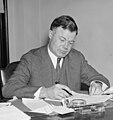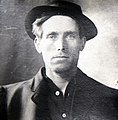Portal:Organized Labour

Introduction

- In trade unions, workers campaign for higher wages, better working conditions and fair treatment from their employers, and through the implementation of labour laws, from their governments. They do this through collective bargaining, sectoral bargaining, and when needed, strike action. In some countries, co-determination gives representatives of workers seats on the board of directors of their employers.
- Political parties representing the interests of workers campaign for labour rights, social security and the welfare state. They are usually called a labour party (in English-speaking countries), a social democratic party (in Germanic and Slavic countries), a socialist party (in Romance countries), or sometimes a workers' party.
- Though historically less prominent, the cooperative movement campaigns to replace capitalist ownership of the economy with worker cooperatives, consumer cooperatives, and other types of cooperative ownership. This is related to the concept of economic democracy.
The labour movement developed as a response to capitalism and the Industrial Revolution of the late 18th and early 19th centuries, at about the same time as socialism. The early goals of the movement were the right to unionise, the right to vote, democracy, safe working conditions and the 40-hour week. As these were achieved in many of the advanced economies of western Europe and north America in the early decades of the 20th century, the labour movement expanded to issues of welfare and social insurance, wealth distribution and income distribution, public services like health care and education, social housing and common ownership. (Full article...)
Selected article

A credit union is a member-owned nonprofit cooperative financial institution. They may offer financial services equivalent to those of commercial banks, such as share accounts (savings accounts), share draft accounts (cheque accounts), credit cards, credit, share term certificates (certificates of deposit), and online banking. Normally, only a member of a credit union may deposit or borrow money. In several African countries, credit unions are commonly referred to as SACCOs (savings and credit co-operatives).
Worldwide, credit union systems vary significantly in their total assets and average institution asset size, ranging from volunteer operations with a handful of members to institutions with hundreds of thousands of members and assets worth billions of US dollars. In 2018, the number of members in credit unions worldwide was 375 million, with over 100 million members having been added since 2016.
Leading up to the financial crisis of 2007–2008, in 2006, 23.6% of mortgages from commercial banks were subprime, compared to only 3.6% of those from credit unions, and banks were two and a half times more likely to fail during the crisis. American credit unions more than doubled lending to small businesses between 2008 and 2016, from $30 billion to $60 billion, while lending to small businesses overall during the same period declined by around $100 billion. In the US, public trust in credit unions stands at 60%, compared to 30% for big banks. Furthermore, small businesses are 80% more likely to be satisfied by a credit union than with a big bank. (Full article...)
January in Labor History
Significant dates in labour history.
- January 01 - The 1966 New York City transit strike began; the United Transportation Union was founded; the Swedish Trade Union Confederation was founded; Union Network International was founded; the Workplace Relations Act 1996 entered into force in Australia
- January 02 - The Sago Mine disaster occurred in the 2006 in the U.S.
- January 03 - The 1929 Australian timber workers' strike began; Guy Ryder was born
- January 04 - The St. John's University strike of 1966–67 began in the U.S.; the Oil, Chemical and Atomic Workers International Union merged in 1999 with the United Paperworkers International Union to form the Paper, Allied-Industrial, Chemical and Energy Workers International Union
- January 05 - The 1891 Australian shearers' strike began; the 1919 Spartacist uprising began in Berlin
- January 07 - Edward T. Hanley died; A. P. T. James died
- January 08 - SEIU Local 1.on was founded
- January 09 - Maurice Hutcheson died; Sol Chick Chaikin was born
- January 11 - The 1912 Lawrence textile strike began in the U.S.; Paper, Allied-Industrial, Chemical and Energy Workers International Union merged with the United Steelworkers; Bogdan Borusewicz was born
- January 12 - Cornelius Shea died
- January 14 - The Reesor Siding strike of 1963 began in Canada; Joseph Glimco was born
- January 15 - Michael Sommer was born; the song "Solidarity Forever" is written; the Steel strike of 1959 ends in the U.S.
- January 16 - Dutta Samant was murdered; Leonard Woodcock died; Daniel John O'Donoghue died
- January 17 - Pablo Manlapit was born
- January 18 - The U.S. Supreme Court decided Moyer v. Peabody in 1909; Mary Kenney O'Sullivan died; the 1912 Brisbane general strike began in Australia; the Dublin Lock-out ended in 1914; Paul Keating was born; the Great Bombay textile strike began
- January 19 - Thomas Kennedy died; Morris Kight died; Bill Andersen died; Annie Buller died
- January 20 - The Tunisian General Labour Union was founded; trade unions launched the 2005 civil unrest in Belize; Harriot Eaton Stanton Blatch was born; Bruce Nissen was born
- January 21 - Edward T. Hanley was born; Bill Andersen was born; J. H. Thomas died; Nicholas Pollard Sr. died
- January 22 - The United Mine Workers was founded; Terence V. Powderly was born; Andrew Furuseth died; Chea Vichea was murdered; Gyula Peidl died; Ong Teng Cheong died
- January 23 - David Sullivan died; Nikolaus Gross died
- January 24 - The Wapping dispute began in 1986 in the U.K.; Emil Rieve died; the 1977 Massacre of Atocha occurred in Spain; Henri Krasucki died; Herbert Hill was born; the Supreme Court of Canada issued its reasoning in R.W.D.S.U., Local 558 v. Pepsi-Cola Canada Beverages (West) Ltd.; the Alliance for Labor Action was dissolved
- January 25 - The Sheet Metal Workers' International Association was founded; Matthew Woll was born; Chummy Fleming died
- January 26 - Bernard Kleiman was born
- January 27 - Samuel Gompers was born; the U.S. Supreme Court decided Lechmere, Inc. v. NLRB; Ben Tillett died; the U.S. Supreme Court decided Adair v. United States; Frank Tudor was born
- January 28 - Mike Quill died; Harry Lundeberg died; Mike Moore was born; James Scullin died
- January 29 - The Timex strike began in 1993 in Scotland; Anna LoPizzo died; John M. Dunn died
- January 30 - Edward Heitmann died
- January 31 - The 1919 Battle of George Square occurred in Scotland; New Orleans fired all members of the United Teachers of New Orleans in the wake of Hurricane Katrina; Bob Semple died
More Did you know (auto-generated)
- ... that in 1969, the first women's strike for equal pay in the Netherlands was called in a cigar factory in Nieuwe Pekela?
- ... that following the ban of its labour unions in 1934, the Romanian United Socialist Party would rely on its youth and women's wings for political action?
- ... that in the 1951 court case Kuzych v White, on appeal from the British Columbia Court of Appeal, five law lords of the British Judicial Committee ruled in favour of a Communist-led trade union?
- ... that the execution of Burkinabé trade union leader Soumane Touré was prevented by the intervention of his childhood friend, then-president Thomas Sankara?
- ... that 55,000 Berlin workers went on strike on 28 June 1916 to protest the arrest and trial of anti-war campaigner Karl Liebknecht?
- ... that on February 3, 1986, African Independence Party leaders Adama Touré and Adama Touré were released from detention?
Related Portals
Selected image
Selected Quote
"Labor can not stand still. It must not retreat. It must go on, or go under."
|
— Harry Bridges |
Did you know
- ...that actor Edward Chapman, known for his role as "Mr. Grimsdale" in many Norman Wisdom films, tried to have Sir John Gielgud thrown out of Equity?
- ...that Teamsters president Dave Beck invoked his Fifth Amendment right against self-incrimination 117 times before a U.S. Senate investigating committee?
- ...that the 1998–99 NBA lockout forced the cancellation of 464 regular-season National Basketball Association games?
Topics
Get involved
Also see our sister WikiProject, Housing and Tenant Rights!
Associated Wikimedia
The following Wikimedia Foundation sister projects provide more on this subject:
-
Commons
Free media repository -
Wikibooks
Free textbooks and manuals -
Wikidata
Free knowledge base -
Wikinews
Free-content news -
Wikiquote
Collection of quotations -
Wikisource
Free-content library -
Wikiversity
Free learning tools -
Wiktionary
Dictionary and thesaurus















































































